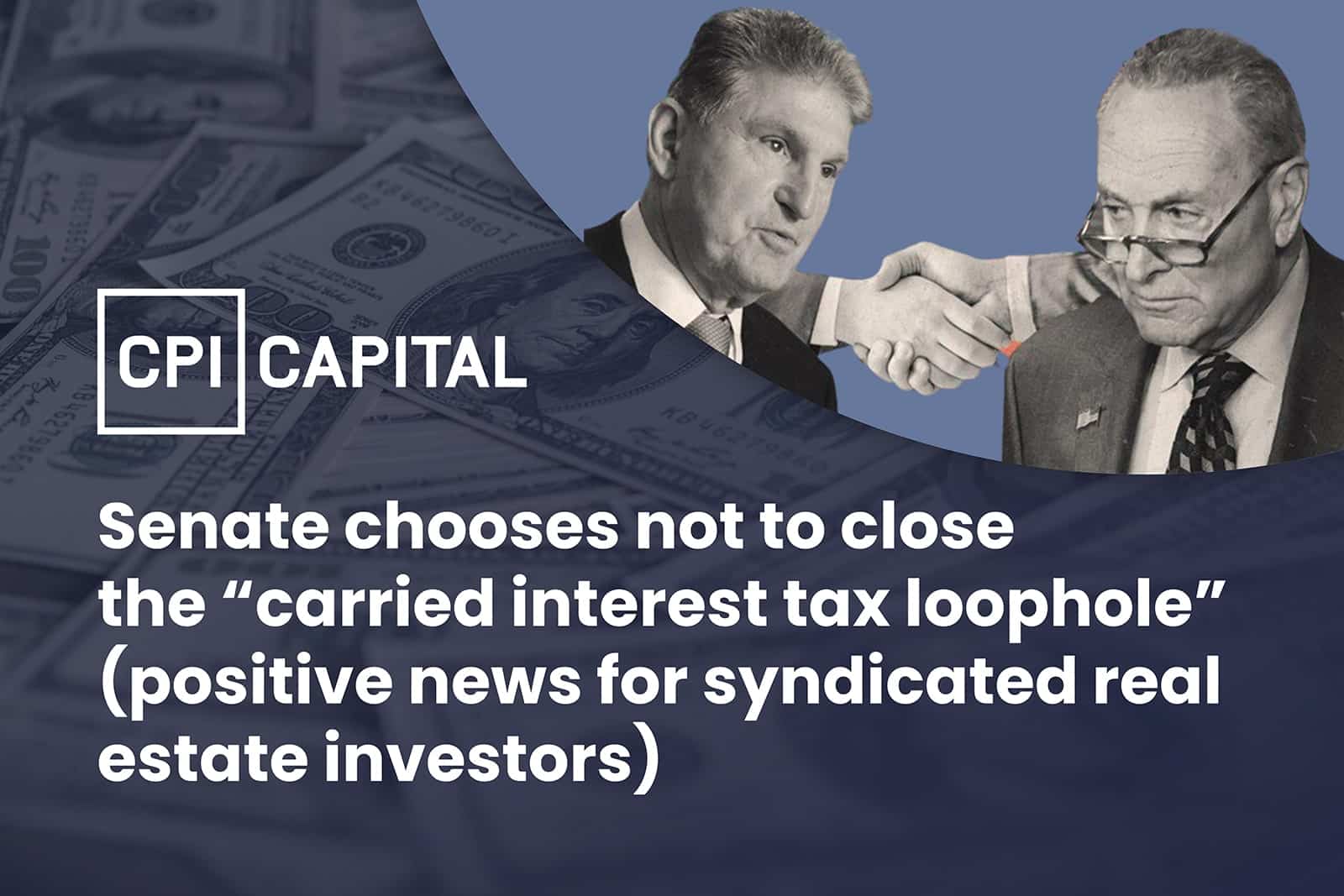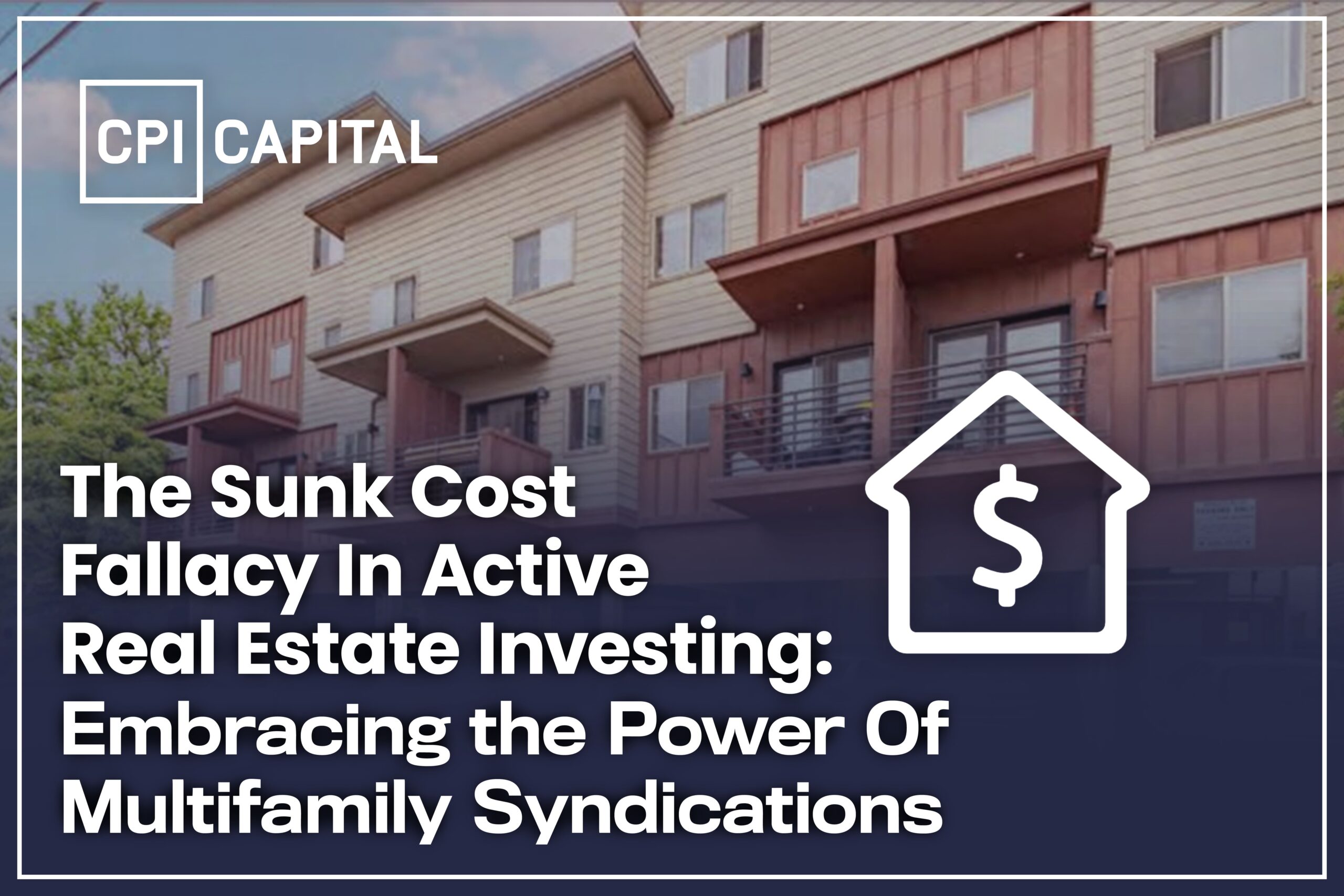
Dear valued investors and future investors,
A sincere welcome to CPI Capital’s weekly news briefing containing a mixture of updates, commentary and topical articles about the lucrative world of real estate investment.
This week we are going to look at the so-called “carried interest tax loophole”–in the news yet again!
But, first, if you are already a subscriber to our newsletter, thank you. If not, why not sign up to our newsletter now so as to keep right up to date with all you need to know about syndicated real estate investment?
What is a “carried interest”?
A carried interest (sometimes simply called “carry”) is fundamentally a performance fee, rewarding the general partners of a syndicated real estate investment for enhancing a property’s performance. This will be paid as a share of the profits from the investment.
Such interest also refers to when a share of a private equity or hedge fund’s profits are paid to the fund’s managers.
What is the carried interest tax loophole?
Whilst this carried interest is taxed, a major cross-party concern for some time has been how it’s taxed. In short, syndicated promoters or general partners and/or fund managers who have a carried interest receive tax breaks on such carry.
The anomaly or the loophole is that such earnings are treated as capital gains, so they’re taxed at a maximum rate of 20%, rather than the maximum tax rate of 37% for income.
Why is the tax loophole controversial?
It is claimed that the carried interest tax loophole allows syndications or private equity real estate investors to avoid billions in taxes each year. Indeed, this loophole has long been one of the most controversial features of the US tax system, but has survived repeated attempts by both Republicans and Democrats to close it.
Essentially, the loophole allows high earners to pay taxes at a much lower rate than most others, with a major inequality appearing when those earning several hundred thousand per annum are in a lower tax bracket than someone earning $60,000.
Specifically, critics allege that this mis-classifies how asset managers and their investment vehicles make money.
What has happened with the tax loophole recently?
The House gave final congressional approval on Friday, August 12th to a $704 billion spending bill named as the Inflation Reduction Act, a scaled-back version of the so-called “Build Back Better” bill.
The primary aims of the bill are to tackle climate change, the high cost of prescription drugs and lower the deficit by around $300 billion. It was passed without any Republican support and will now go to President Biden for his signature.
However, importantly for real estate investors, language closing the carried interest tax loophole and planning to raise tax to 37% was cut from the proposed package.
This omission was announced by Senate Majority Leader Chuck Schumer and Senator Joe Manchin and means that potentially higher taxes for corporations or syndications will no longer come into effect. Had it done so, some estimates suggest that the increased levels of taxation from carried interests could have raised $15 billion over the next 10 years.
Obviously, closing such a loophole would have had a noticeable impact on the private equity real estate market but, on Thursday, the Democrats agreed to drop such provision to win the support needed from Senator Krysten Sinema for the bill to pass the Senate.
The new bill may, however, now possibly include a 1% tax on corporate stock buybacks.
As with many real estate investors, CPI Capital believes that closing the carried interest tax loophole may have had a major impact on the way investors look at real estate private equity investments. This is mainly as changing the basis upon which carried interest was treated (ie a capital gains vs income), thereby increasing taxation levels would likely have an adverse effect upon the chances of new investment funds being created.
Given that the US economy just shrank for the 2nd quarter in a row, now is not an appropriate time to implement a revised tax on private equity capital and the compromise on the bill endorsed by the Senate clearly recognises this.
Many passive and other investors, small businesses and pension holders across the US rely upon syndicated real estate investment opportunities as a supplement to their income in these challenging, inflationary times and to implement a higher tax regime would take this away!
Yours sincerely
August Biniaz
CSO, COO, Co-Founder CPI Capital

Ready to build true wealth for your family?
It all starts with passive income. Apply to join the CPI Capital Investor Club.
Search
Recommended

What is the Correlation Between Bond Yields and Real Estate Cap Rates?
Dear valued existing investors and future investors, Welcome to CPI Capital's regular news...

The Sunk Cost Fallacy In Active Real Estate Investing: Embracing The Power of Multifamily Syndications
Dear valued existing investors and future investors, Welcome to this week's CPI Capital's news...

Key Metrics Every Multifamily Investor Needs to Know
Dear valued existing investors and future investors, Welcome once again to this week’s CPI...


